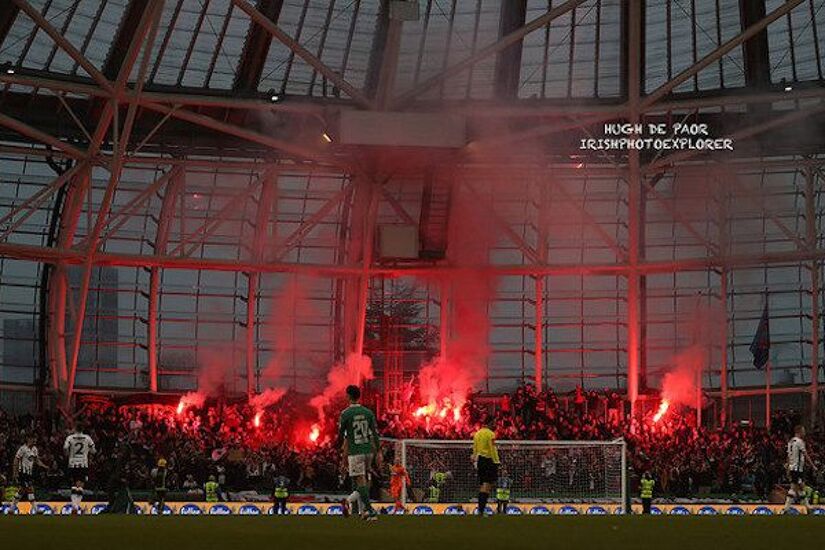The last of the punk rock leagues?

Credit: Hugh de Paor (ETPhotos)
In August 2014, former Irish international Colin Healy scored a 90th minute bicycle kick to give Cork City a 1-0 win against St. Patricks Athletic.
The seasoned midfielder watched the flight of the ball from inside of the area before readying himself, his back to the Shed End. He caught it overhead and scored to send Turner’s Cross into wild celebrations.
As the goal trended on social media, Colin Healy momentarily became the centre of the footballing world. It was a moment of chaos at the Cross, and if anything could do the moment justice it was one comment on YouTube calling it a scene from “the last punk rock league in Europe.”
In a single strike, Colin Healy and the scenes from Turner's Cross had captured not just the spirit of the moment, not the club or city, but the whole league.
It may be 40 years since the scene so associated with the rebellious choruses of ‘Pretty Vacant’ and ‘Teenage Kicks’ but the sub culture of the disenfranchised youth of the 70s is alive and well on Irish terraces. As the establishment elites became vilified under the catchy choruses of days not too far gone, the League of Ireland takes root.
It is a sense of rebellion which has underpinned the Irish footballing story since the earliest of days in 1920. Long before the days of the Sex Pistols and the Undertones, there was the FAI and the Irish Free State. Unknowingly, this punk rock state of mind of rebellion was formed in our footballing mindset from this time.
Beginning with a battle for status at home and to the world governing bodies, football existed as a subculture in a country consolidating its newfound sovereignty and sense of nationalism.
Out of the battle for status, Ireland’s football history became defined by ignorance for odds. Memories of Euro 88 and Giants Stadium in New York from 1994 may be inspirational still, but it is the League of Ireland which truly embodies the modern day rebellion.
Deemed ‘the problem child’, the League of Ireland has been forever cast out as the poor relation of Irish football. Facing against the financial juggernaut and global appeal of the English Premier League, the domestic scene has always been one of opposition as it consolidated its place in the national mindset.
As Ireland became the biggest country in Europe over a population of four million people without a fully full time professional football league, it also became a country synonymous with wealthy elites at the top levels of footballs governing body.
These ballooning finances have been reflected in recent scandals with the organisation, showing the once counter culture became the appropriated sense of being.
Through all this, the domestic scene endured. The collapse of clubs such as Sporting Fingal, Monaghan United and near misses for numerous clubs have shown the uncertainty as the league banded together under one cause united.
It is a cause which has been taken by the fans themselves. Clubs such as Cork City, Shamrock Rovers, Galway United, Bohemians, Cobh Ramblers, Wexford Youths are all essentially fan owned with the fans placing clubs directly into soul of the communities.
It is a leftist idea away from the corporate governance so associated with the modern game, as the fans take control for anyone to join in. Anyone can take part or get involved in a transparent structure run directly through the streets the people call home.
This is something not just confined to the footballing terraces. Initiatives such as the ‘more than a club’ between Cork City and Bohemians have placed the club’s community links deepened through local programs and social work.
The recent league tie between Finn Harps and Shamrock Rovers was preceded with a food drive for local communities between both sets of fans. The very next day, Cork City fan group First Cork City Brigade were seen marching against racism alongside minority groupings through the city centre.
It is the people’s league. It is the social contract for communities on Friday evenings. The saving grace against the troubles of modern life. It is the eternal rebellion, a punk rock state of mind.
From verse of punk and the rebellious past, this is the League of Ireland, inspired as the people’s league, the last of the punk rock leagues in Europe, the self-titled Greatest League in the World.

